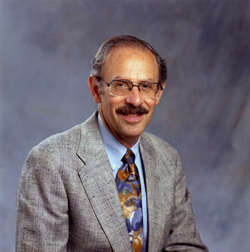Large-scale study finds treatment standard for rare cancer
Written by: Justin Harris; contact by telephone: 734-764-2220
International adrenal cancer consortium started at University of Michigan allows for ongoing research initiatives

Ann Arbor - Initial results from a first-of-its-kind international consortium of adrenal cancer researchers suggest there might be a treatment standard for patients with this extremely rare and deadly disease.
The consortium - which grew out of an international adrenal cancer symposium at Michigan Medicine in 2003 - is the first effort to compare treatment regimens in patients with advanced adrenal cancer.
About 600 Americans a year are diagnosed with adrenal cancer and almost all will die within five years of diagnosis.
Because of the small number of people diagnosed, conducting clinical research to improve treatments is challenging for individual cancer programs and physicians, who do not see enough patients with this disease.
The study, which was conducted at 40 adrenal cancer specialty centers across 12 countries, randomly assigned 304 patients with advanced adrenal cancer to undergo one of the two most successful combination chemotherapy treatments. One treatment combined the chemotherapy drugs etoposide, doxorubicin and cisplatin (EDP) with mitotane, and another combined streptozocin with mitotane.
Researchers found that the EDP plus mitotane treatment staved off progression of the disease longer than the other option. Neither regimen improved how long patients lived. Results were published in the New England Journal of Medicine.
"The poor overall survival rates in our study confirm the poor prognosis for patients with advanced adrenal cancer and support the need for improved treatment options," says David E. Schteingart, M.D., a professor emeritus of internal medicine at U of M and one of the paper's co-authors.
Patients who received EDP plus mitotane survived without their cancer progressing for more than five months, as opposed to only two months with the streptozocin plus mitotane treatment.
Schteingart said the study is groundbreaking in that it is the first to look at adrenal cancer treatment on such a large scale. Because adrenal cancer is very rare, large-scale trials are difficult to execute, making statistically significant research results hard to attain, Schteingart says.
"In order to study enough patients, we needed to pull together available resources in many different places," he says. "And that's what happened. For rare diseases, it's essential to have this type of collaborative effort in order to glean useful information for treating patients."
While the results might suggest a better first-line treatment for patients with adrenal cancer, the trial also lays the foundation for further large-scale trials for patients with the disease, says Gary Hammer, M.D., Ph.D., the Millie Schembechler Professor of Adrenal Cancer and the director of the Endocrine Oncology Program at the Rogel Cancer Center.
"This research is the first of its kind for a rare cancer," he says, "It shows the strength of a multisite trial, and our collective research agreement will allow us to conduct similar trials in the future."
Additional authors: Martin Fassnacht, M.D., Massimo Terzolo, M.D., Bruno Allolio, M.D., Eric Baudin, M.D., Harm Haak, M.D., Alfredo Berruti, M.D., Staffan Welin, M.D., Carmen Schade-Brittinger, André Lacroix, M.D., Barbara Jarzab, M.D., Halfdan Sorbye, M.D., David J. Torpy, M.D., Vinzenz Stepan, M.D., Wiebke Arlt, M.D., Matthias Kroiss, M.D., Sophie Leboulleux, M.D., Paola Sperone, M.D., Anders Sundin, M.D., Ilse Hermsen, M.D., Stefanie Hahner, M.D., Holger S. Willenberg, M.D., Antoine Tabarin, M.D., Marcus Quinkler, M.D., Christelle de la Fouchardière, M.D., Martin Schlumberger, M.D., Franco Mantero, M.D., Dirk Weismann, M.D., Felix Beuschlein, M.D., Hans Gelderblom, M.D., Hanneke Wilmink, M.D., Monica Sender, M.D., Maureen Edgerly, R.N., M.A., Werner Kenn, M.D., Tito Fojo, M.D., Hans-Helge Müller, Ph.D., and Britt Skogseid, M.D., for the FIRM-ACT Study Group.
Funding: Supported by grants from the German Ministry of Education and Research (01KG0501), the Italian Ministry of University and Research (PRIN 20085 P5S49), Institut Gustave-Roussy Clinical Research Unit, the Cortical and Medullary Endocrine Tumors Network of the French Institut National du Cancer, the Swedish Cancer Society, and the Swedish Research Council. Nested in the FIRM-ACT trial, a study on the pharmacokinetics of mitotane was organized in 40 patients who were enrolled in the FIRM-ACT trial. This substudy was funded by HRA Pharma.
